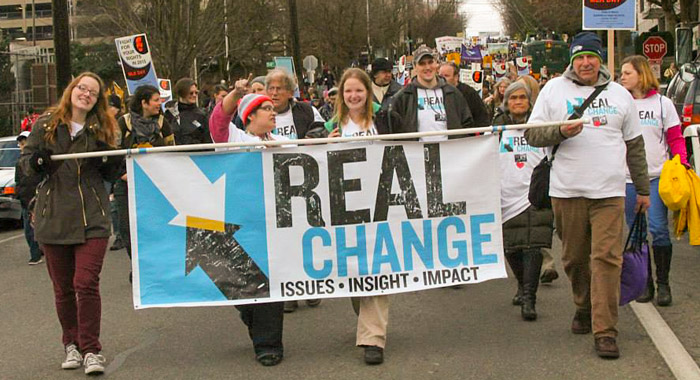Service Journeys Follow Suit for Three Young Alums
Three St. Norbert alumnae who each in turn served as president of the Zambia Project have each, in subsequent years, felt the pull to continue serving the under-resourced through the Jesuit Volunteer Corps Northwest (JVC NW).
Each in their turn packed just one suitcase to live out of for one year. Each agreed to fly across the country to the Pacific Northwest, to room in a new city with seven strangers. There they would share groceries, a house and 12 months of domestic service working with the region’s most vulnerable populations.
A rich tradition
In their undergraduate years, Connie Humann ’12, Rachel Gintner ’14 and Tara Cunningham ’15 each served as president for the Zambia Project – a campus group that raises funds for teacher salaries, school supplies and building materials for public schooling in Lusaka, capital of Zambia.
In making their post-graduate plans, they elected for an increasingly popular option: Over the years many St. Norbert alums have committed to a year or more of service post-graduation. However, only one new grad a year typically elects to join this particular Jesuit organization, and the Zambia Project pattern is unprecedented.
Cunningham, the most recent to graduate, says St. Norbert prepared her well for this new venture: “SNC is phenomenal and has a well-earned reputation as being a service-oriented college. It’s funny, but it’s difficult to graduate without having either participated in service or at least to appreciate its worth.”
One among many
JVC NW invites 150 men and women from across the country to adopt a countercultural lifestyle, one devoted to four core values of community, spirituality, simple living, and social and ecological justice. The volunteers serve full-time at agencies in rural and urban locales across Alaska, Washington, Oregon, Idaho and Montana.
Living in intentional community with three to eight housemates, these volunteers brave each other’s cooking, eat together, explore their spirituality during themed discussions and spend time learning about one another. While the program covers basic living needs – and in many cases additionally offers AmeriCorps funding – every volunteer is challenged to live off a $100 stipend each month, to live in solidarity with those they serve.
Ruined for life
Humann, who graduated with a B.A. in sociology, heard about JVC NW through the Catholic Volunteer Network and, in 2012, was matched with New Avenues for Youth in Portland, Ore., an organization that educates and empowers young adults experiencing homelessness. “I provided basic needs and GED tutoring. I learned how to embrace every individual, no matter what their circumstance – whether that involved drug use, poverty, foster care or gender transitioning,” says Humann.
“The experience made me ‘ruined for life,’ ” notes Humann, recalling the motto coined by the late Rev. Jack Morris, S.J., co-founder of JVC NW. “I now ask myself questions like ‘Who grew this food?’ ‘How much toxic energy am I putting into the atmosphere?’ ‘How are my behaviors affecting those around and those to come?’ ”
Humann has earned her Master of Education from Marquette University. She focused on student affairs in higher education and completed an internship at University of Wisconsin-Waukesha, where she propelled first-generation and at-risk students toward a more affordable college experience. She says, “Ideally, I will stay in higher education for college access and success, but my active volunteering may lead me to other work.”
Gintner also served those experiencing homelessness at Real Change Homeless Empowerment Project, the street paper of Seattle. “It’s the only street paper in Washington, and provides low-barrier employment to over 350 vendors who are often homeless or come from a low-income background,” says Gintner.
“I sell the paper to our vendors and direct them to other social service agencies, in addition to managing our drop-in space,” says Gintner. “Seattle is at the heart of the homelessness crisis in the U.S. I feel empowered to help make whatever difference I can.” Gintner, who finished her program this July, will move to Columbus, Ga., this fall to find work in the nonprofit sector in writing, editing or communications.
Meanwhile, Cunningham is about to move to Yakima, Wash., where she will serve as program coordinator at Rod’s House. “I’ll be helping homeless and at-risk youth gain immediate-relief resources, refer them to other agencies, and conduct outreach on the street and in schools,” says Cunningham.
“I never had a particular interest in working with the homeless, until I was assigned a similar internship in my study-abroad experience in London. I enjoy working with youth and, though it will be difficult and heart-wrenching at times, it is so important to help these individuals and reduce the stigma associated with homelessness,” says Cunningham.
Cunningham plans to be a social worker. After her service year she hopes to move to Seattle to attend graduate school.
Aug. 4, 2015












